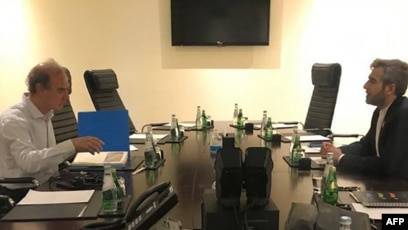FILE - This handout from Iranian news agency IRNA shows Iranian chief nuclear negotiator Ali Bagheri Kani, right, meeting with European Union nuclear talks coordinator Enrique Mora in Doha, Qatar, June 28, 2022.
FILE - This handout from Iranian news agency IRNA shows Iranian chief nuclear negotiator Ali Bagheri Kani, right, meeting with European Union nuclear talks coordinator Enrique Mora in Doha, Qatar, June 28, 2022.
A day after indirect talks between the United States and Iran on a return to the 2015 nuclear deal ended unsuccessfully, diplomats said Thursday that Tehran has brought new demands to the table.
"We understand that not only has Iran not taken up the offer on the table, but that it also added yet more issues which fall outside the JCPOA, with maximalist and unrealistic demands,” France’s U.N. envoy, Nicolas de Riviere, told a meeting of the U.N. Security Council on the Joint Comprehensive Plan of Action, or JCPOA.
He, and other diplomats, did not detail what those new demands were.
The Security Council meets twice each year to review implementation of the nuclear deal, which it endorsed in a resolution. The 2015 landmark agreement provided Iran with sanctions relief in exchange for limits on its nuclear program. Tehran denies seeking nuclear weapons.
Under the Trump administration, the United States pulled out of the JCPOA in 2018 and reimposed sanctions. In 2019, Tehran resumed advancing its nuclear program, enriching uranium beyond permitted thresholds, among other steps.
In addition to Iran, the remaining parties to the deal are Britain, China, France and Russia, plus Germany.
Doha talks
The European Union holds a coordinator position. It served as the intermediary in the indirect talks in the Qatari capital of Doha earlier this week between U.S. special envoy Robert Malley and Iran’s chief negotiator, Ali Bagheri Kani.
EU Ambassador Olof Skoog told the council that from the coordinator’s perspective, they believe there is a good deal on the table, arrived at after more than a year of multilateral negotiations, and “the space for further significant changes has been exhausted.”
That deal has been sitting on the table since March.
“This is not a bilateral deal between Iran and the United States,” Skoog emphasized. “Very tough political choices had to be made by all JCPOA participants and the United States to reach the current delicate balance in the text.”
FILE - Olof Skoog, European Union ambassador to the United Nations, speaks during a meeting of the Security Council, April 5, 2022, at U.N. headquarters.
FILE - Olof Skoog, European Union ambassador to the United Nations, speaks during a meeting of the Security Council, April 5, 2022, at U.N. headquarters.
He expressed concern negotiations could ultimately fall apart.
“My message is seize this opportunity to conclude the deal, based on the text that is on the table. The time to overcome the last outstanding issues, conclude the deal and fully restore the JCPOA is now,” Skoog said.
Iran’s envoy said its team has negotiated in good faith and been flexible, and blamed Washington’s “unrealistic and rigid approach” for the current impasse.
“Our negotiating team is ready to engage constructively again to conclude and reach a deal,” Ambassador Majid Takht Ravanchi told council members. “The ball is in the United States’ court, and if the U.S. acts realistically and shows serious intention to implement its obligations, the agreement is not out of reach.”
No 'real urgency' seen from Iran
Washington’s envoy expressed frustration with Iran following Doha and a visit to Tehran by the European Union’s foreign policy chief last week.
“In light of these efforts, we were all the more disappointed that, in High Representative [Josep] Borrell’s visit to Tehran on Saturday, and in the indirect discussions the EEAS [the European Union’s diplomatic corps] conducted in Doha this week, Iran continued to make demands that go well beyond the JCPOA,” Deputy U.S. Ambassador Richard Mills said. “Iran has yet to demonstrate any real urgency to conclude a deal, end the current nuclear crisis and achieve important sanctions lifting.”
Mills said a deal could be finalized only if Iran drops its additional demands that go beyond the scope of the JCPOA.
“The ball is in Iran’s court and the choice to move back towards full implementation of the JCPOA rests with Iran,” he said.
With each party urging the other to move first, it remains unclear whether the 2015 deal can be revived.




No comments yet
Be the first to share your thoughts!